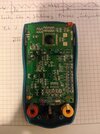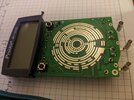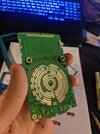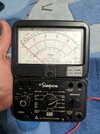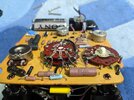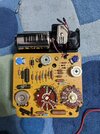Fluffyboii
Active Member
I am sick of broken multimeters. The digital stuff it seems always go bad in a way that is inrepairable somehow. I destroyed my first multimeter which was a gift with EMP gun I made by tazing a coil of wire that happened to be too close to it. After that happened I bought another one and that one was just draining 9V batteries by itself even when it was closed so I ended up not using it since I did not have 6 9V batteries laying around. So I got another small better quality unit that was lot pricier at the time from a local seller hoping it would last long. That one ended up going berserk by itself after 2 years or so. I thought it was batteries so I gave it new ones but it seems like its processor or chip that does all of the black magic gone bad.
I have a Simpson 260 multimeter I purchased for like 5USD from landfill and fixed by gluing broken posts inside that were supposed to hold the middle selector switch close to the PCB. I used it for a while then middle selector switch started only working in certain places with applied pressure. Unfortunately it got some copper oxide on contacts that is resilient to %99ISO and other rust removal stuff I have so I need to take it apart to properly clean all the contacts it has inside. At least it should be repairable because it is old. Although even if I fix it I will not use it all the time since it is precious and very big.
Final cheap multimeter I got started acting up again with illogical behavior after only week of usage. I just want to measure DC, resistors and sometimes DC current. I rarely measure AC since AC stuff I want to measure is usually thousands of volts anyway and I got a small oscilloscope I can use for high frequency low voltage readings. I don't need fancy stuff for but cheap stuff keeps breaking down and feels awful to use. Sometimes I can link device failure to my user error but it is usually randomly occurring nonsense as I explained.
Anyway I still need something digital for the ease of use that will last long. I checked up the Aneng AN8008 and similar cheaper than Fluke but still should be decent models. Prices seem to be all over the place. Also I live in a sad country buying from overseas adds a lot of tax and even 35USD multimeter is considered very expensive because... From my understanding having true RMS and auto scale at least proofs some quality of the device even though I don't need those features. Maybe I should just get a cheap analog meter since they don't die from digital illness by themselfs. Or should I just buy something meaninglessly advanced and high quality since it is my fate to use it for a very long time. It is not that I can't afford a good meter, I just don't need all the bells and whistles and can not justify prices of some.
I have a Simpson 260 multimeter I purchased for like 5USD from landfill and fixed by gluing broken posts inside that were supposed to hold the middle selector switch close to the PCB. I used it for a while then middle selector switch started only working in certain places with applied pressure. Unfortunately it got some copper oxide on contacts that is resilient to %99ISO and other rust removal stuff I have so I need to take it apart to properly clean all the contacts it has inside. At least it should be repairable because it is old. Although even if I fix it I will not use it all the time since it is precious and very big.
Final cheap multimeter I got started acting up again with illogical behavior after only week of usage. I just want to measure DC, resistors and sometimes DC current. I rarely measure AC since AC stuff I want to measure is usually thousands of volts anyway and I got a small oscilloscope I can use for high frequency low voltage readings. I don't need fancy stuff for but cheap stuff keeps breaking down and feels awful to use. Sometimes I can link device failure to my user error but it is usually randomly occurring nonsense as I explained.
Anyway I still need something digital for the ease of use that will last long. I checked up the Aneng AN8008 and similar cheaper than Fluke but still should be decent models. Prices seem to be all over the place. Also I live in a sad country buying from overseas adds a lot of tax and even 35USD multimeter is considered very expensive because... From my understanding having true RMS and auto scale at least proofs some quality of the device even though I don't need those features. Maybe I should just get a cheap analog meter since they don't die from digital illness by themselfs. Or should I just buy something meaninglessly advanced and high quality since it is my fate to use it for a very long time. It is not that I can't afford a good meter, I just don't need all the bells and whistles and can not justify prices of some.
